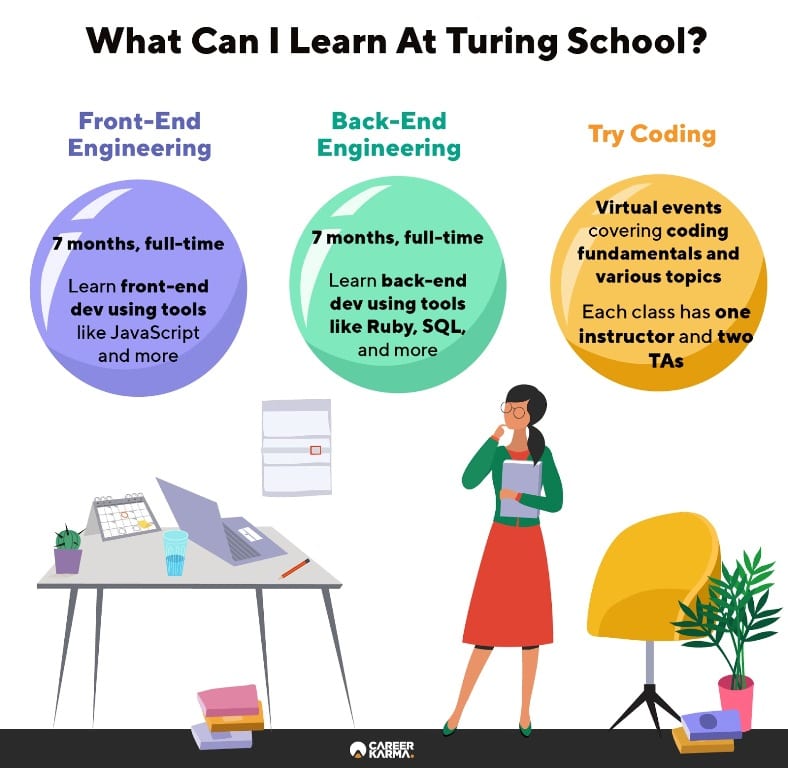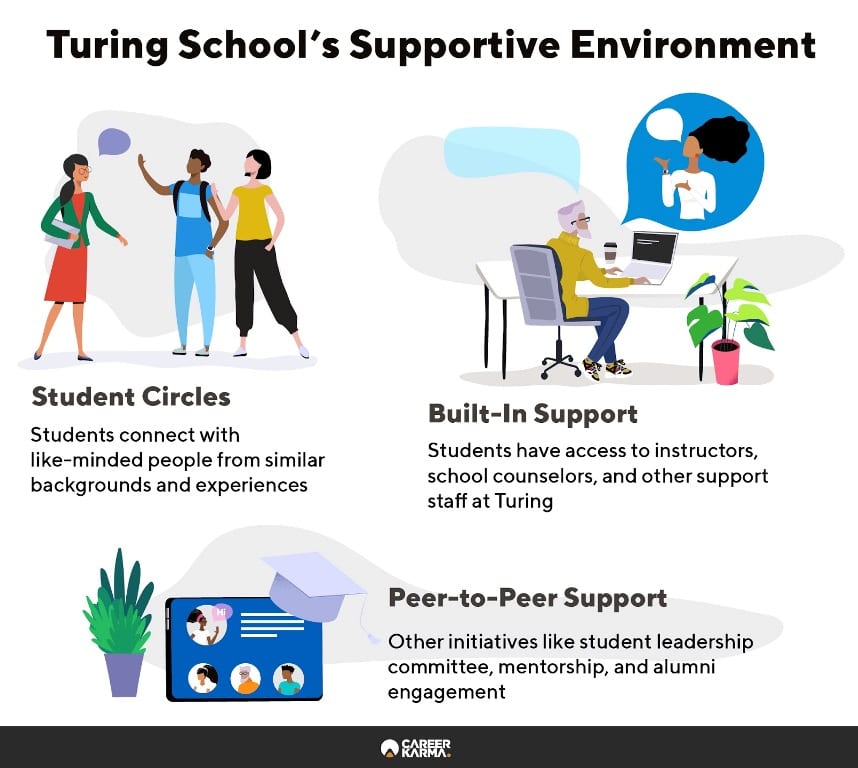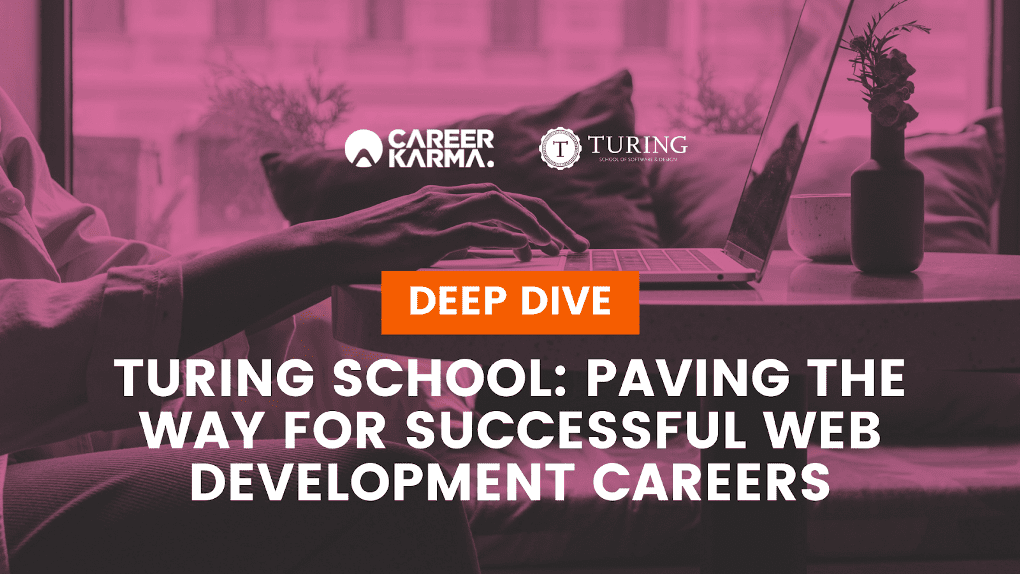Many misconceptions surrounding the tech job market exist. Largely, many believe that the market is oversaturated and that open positions in tech simply don’t exist—and this isn’t the truth.
Turing School seeks to optimize and prolong the depth of tech education that it offers. Turing is a nonprofit, offering longer training programs. As opposed to several weeks in a more traditional bootcamp framework, Turing School’s programs last seven months.
Its commitment is now with remote learning and this is the framework the school operates under. Turing’s curriculum is rigorous and time commitment is one of its key characteristics. Turing has remained true to its core since the beginning—its priority is helping students do the job to get the job.
Essentially, Turing simulates the job environment as closely as possible in order to prepare its students for what is ahead in their future careers. While Turing definitely does present a challenge, let’s take a deep dive into what Turing can do for you, your career, and your future.
Turing School Educational Approach
Turing operates under a schedule that is referred to as full-time plus. Generally, anywhere between 60 to 80 hours of weekly work are the baseline expectations for online work, online studying, group collaboration and communication regarding work, and more.
In terms of the group setting, students are matched with 24 to 30 fellow Turing students to work together on projects. While this may seem daunting, it is definitely worth mentioning that Turing knows the needs of its students. Turing’s approach is largely centered on the steady, continuous flow of learning so that no matter which field a student chooses to explore, they will do consistently well and do so with full confidence.
It should be noted that half of the instructors at Turing have industry experience, so they are able to give valuable insights into the learning materials, as well as demonstrating empathy toward students as individuals on an educational journey. Should a student, for example, feel the need to repeat a module to gain a deeper understanding of the course content, they can do so at no additional charges.

Turing School Courses
Turing School offers two programs, both of which are in-depth and comprehensive. The first is Turing’s Front-End Engineering program, which focuses on the user of the software that is being created. This program focuses largely on JavaScript and the experiences of where and how code is executed. This is generally opposed to working more closely with the actual data and data trends, which are the primary focus of Turing’s Back-End Engineering program.
Students in both programs work to build applications that are fully functioning and user-friendly but the major difference is that Front-End students use languages like JavaScript to build the ‘external’ part of an application—the part that users interact with—while Back-End students work on the ‘internal’ part using Ruby and SQL databases.
Finding yourself torn between which program is for you? Turing offers Try Coding workshops, which span from a few hours to full weekend workshops. These events, which cover the basics of front-end and back-end engineering, allow prospective students to try their hand at coding with the real-time support of Turing instructors. Those who have completed any of the Try Coding events will also receive $500 in scholarship with Turing.
Turing School Financing and Scholarships
Turing School’s tuition is $20,000, but there exists a multitude of opportunities and financing methods to help students fund their education. Aside from making an upfront payment, students can also obtain loans from any of Turing’s lender partners like Sallie Mae, Ascent, and Climb.
Turing values a heavy focus on equality, ensuring that all of its students get everything that they’d need to succeed. As such, it has many diversity-focused initiatives and scholarships that are available to students who meet the requirements. For example, under its Internal Diversity Scholarship, two $4,000 scholarships are given to historically underrepresented students per cohort.
Vocational rehabilitation is also available to those with disabilities. The school also accepts GI Bill benefits to help more veterans transition into tech. The best way to further discuss eligibility and find a financing way that suits you best is to contact Turing.

Turing School Community Support
Mental health support also is largely available at Turing, as are multiple routes of community support. For example, Student Circles, which can be read about here, are student-led initiatives that allow underrepresented students to create and exist within communities of like-minded people from similar backgrounds and experiences.
At the moment, some of the Student Circles that are available include Black at Turing (B@T), Jews of Turing, Mezcla (for students who identify as Latinx/Hispanic/Chicanx), and QueerQoders (for members of the LGBTQIA+ communities.)
Additionally, students can also seek support from the instructors, the school counselor, and other members of the “Turing family” who are always available to lend a helping hand. Students can seek one-to-one support from instructors and counselors. Furthermore, each student is assigned a mentor who themselves is a Turing alum. Other major avenues of support that Turing offers include the student leadership committee, relationship-building opportunities specific to each cohort, mentorship, as well as engagement with alumni.
Turing School Outcomes
A Turing graduate has many opportunities for success beyond the doors of Turing School. Where will a student end up? Many internal and external opportunities exist. It’s important to recall that Turing focuses on the incoming, prospective student and how their career possibilities can be expanded, transformed, and maximized for the booming tech world.
Many Turing graduates, for example, have successfully found employment as junior developers. Turing reports a 74-day hire time on average, but this can certainly be accelerated and expedited based on experience. The school also reports an average starting salary of $75,000. While this is achievable, the salary outlook would depend on several other factors like job requirements and location.
Turing students have gone on to work for software development companies, large tech firms, and other organizations. Software developer and Turing grad Rebecca Hyland wrote about her experience at Turing, comparing it to a mountain climb. It outlines that while there definitely are challenges, you shift and grow throughout the journey.
“Even though you are 100% exhausted, the trek is not over. But up in that thin air, something’s changed, and that something is you. Knowing you crushed your goal makes you even more sure: there’s another fourteener in your future… 3, 2, 1: Climb.”
For more reading about the career experiences of Turing grads, here is an insightful article featuring a survey of over 800 Turing alumni on their lives post-Turing.
Turing School Application Process
The application process at Turing School is fully online. Its programs are open to prospective students of at least 18 years of age, with at least a high school diploma or equivalent GED. Another crucial requirement is that prospective students live within two hours of Mountain Time, so as to be adequately prepared and punctual for lectures, which are held on weekdays from 9 am to 4 pm mountain time via Zoom.
Turing’s application process takes about an hour to complete. It includes a logical reasoning assessment of eight questions to help the admissions team can gain a better understanding of the thought processes of potential students.
Is Turing Right For Me?
Because of the challenges that Turing presents to prospective students, an ideal Turing student is an individual possessing grit, fortitude, the desire to learn, and the willingness to work hard. Turing is actively seeking individuals who are on the search for meaning in their careers. Additionally, people who seek to make a difference in the tech world as a whole are also strong fits for a Turing education.
Now that you’ve seen what Turing offers, how their student support and initiatives are branching out and connecting the tech world one student at a time, it’s time to consider whether you could fill in the shoes of a Turing student.
The Turing Perspectives blog is all about “how the Turing School is unlocking human potential.” Check out the blog to read stories of more real students, instructors, and alumni to put faces and human voices to all of the aforementioned concepts, course content, challenges, and outcomes. Further, the blog also offers quarterly outcome reports, so you can see for yourself the work that Turing is regularly and diligently doing to help their students and staff in the world of tech.
Still wondering if Turing is right for you? Get the full picture and gain a better understanding of what awaits at Turing by contacting the school today.
About us: Career Karma is a platform designed to help job seekers find, research, and connect with job training programs to advance their careers. Learn about the CK publication.




